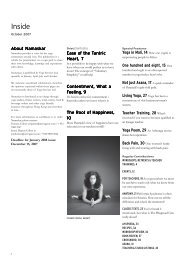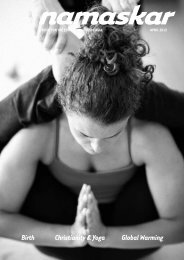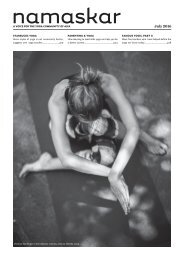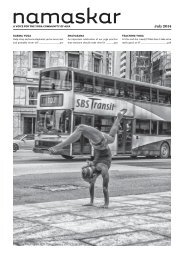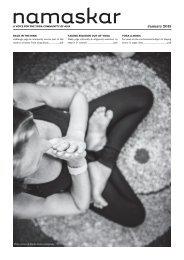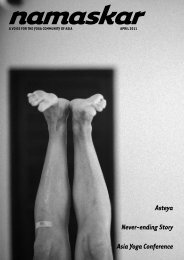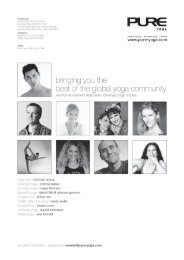Namaskar - Oct 09
Create successful ePaper yourself
Turn your PDF publications into a flip-book with our unique Google optimized e-Paper software.
For Teachers<br />
Feeding the<br />
Yoga Monster<br />
James Figueria<br />
Arrrh! Eat Yoga! Sleep Yoga! Speak<br />
Yoga! Think, think, think. When can<br />
I do a back bends? How do I hop<br />
through like the guy on the video? How’s<br />
my breath now? Is it deep enough? Is this<br />
the right way to do Trikonasana? (I heard<br />
someone say something else). Meat? No<br />
meat? My dosha’s are all off! I’m too Kapha<br />
or is it Pitta? Am I using my Bandas?<br />
Stop for a second. Does this all sound<br />
frighteningly familiar?<br />
I have been a yoga teacher for almost a<br />
decade and increasingly I have come to<br />
believe that with the popularisation of yoga,<br />
partly the result of teachers being eager to<br />
spread the wonders of our yoga experience,<br />
we have been slowly and unwittingly<br />
creating yoga monsters.<br />
how did we become so<br />
obsessed about<br />
physical practice<br />
Let me start with some of my background.<br />
I am an authorized Ashtanga teacher and<br />
before you get ready to knock me off my<br />
high horse I must add that yes, like most<br />
teachers I did teach before I was authorised<br />
and yes I even taught in a gym and yes, I’ve<br />
done my share of workshops around the<br />
world as well.<br />
I was a fitness trainer and a gymnastics coach<br />
for 20 years before I started on my yoga<br />
journey. (I trained people for competitions<br />
and did rehab for injured gymnasts) During<br />
that time, I thought I had met some of the<br />
most obsessive people ever.<br />
They ate only boiled food, measured their<br />
body fat everyday, worked out like crazy and<br />
28<br />
thought about their bodies 24/7.Which all, by the way, had nothing to do with being fit.<br />
But they where just amateurs compared with some of the yoga folks I have met over the<br />
last decade.<br />
If yoga is to make us more aware of our behaviour and our habits and enable us to bring<br />
about inner stillness and calm in our lives, how did we become so obsessed about physical<br />
practice and why does it seem to be only getting bigger.<br />
Who is responsible? Is it the people travelling the world and doing workshops and teacher<br />
training for people they hardly know? Is it the fault of the consumer yoga and yoga<br />
“lifestyle” being fed to us in the slick yoga magazines and on the Internet? Is it our<br />
teaching? Or is it just a natural consequence of this world-wide explosion in yoga?<br />
A few years ago, my teacher, Sri K Pattabhi Jois, was asked about yoga becoming so<br />
popular in the West.<br />
First, he said he was not happy about it, but then he said at the least now more people are<br />
saying and thinking the word yoga than ever before so it’s not so bad. (Just to say the word<br />
yoga can help begin to bring good changes in people).<br />
So what am I trying to say? What is my point you ask? Well it’s very simple. Let’s spread the<br />
word but stop feeding the monsters!<br />
Now I say this because I have had theses sweet little monsters come into my classes and<br />
think, think, think, about every thing else but doing their practice. That’s why the dialogue<br />
at the start of this article is so familiar.<br />
If yoga is state of mind, and to achieve that state of mind we must practice nonattachment<br />
to the fruits of our efforts, which includes non-attachment to the idea of<br />
reaching a perfect state in the practice of yoga asana, then why are we teachers sometimes<br />
more concerned with promoting the perfect yoga pose thereby giving students more to<br />
think about in their asanas than inspiring them to practice?<br />
I hope over the next few months share some things I have noticed and ideas on how we<br />
can continue to promote yoga without getting too far away from the main point of<br />
teaching - which is passing along correct knowledge of yoga, to encourage and inspire<br />
people to want to deepen their own self awareness, and ask deeper questions of<br />
themselves more than “should I jump through straight legs or crossed legs”.<br />
Now before you send me hate mail, I must add that I write this as a direct response to my<br />
own students whom I have somehow turned into little yoga monsters.<br />
It has made me re-think what I say as a teacher in my classes and workshops.<br />
As my teacher says”before thinking one way now thinking different”.<br />
In the end we are all really just students and I don’t think anyone can really teach yoga but<br />
rather we give the tools to help and support others with our own<br />
experience. It is the practice itself that is the real teacher.<br />
James is Director & Principle Teacher of The Yoga Shala in Singapore. He<br />
has over 25 years of teaching experience behind him. Previously he was a<br />
US National Gymnastics Coach. Originally from Hawaii, James has taught<br />
and held work shops in Malaysia, USA, and Africa, as well as Singapore.<br />
www.theyogashala.com.sg







